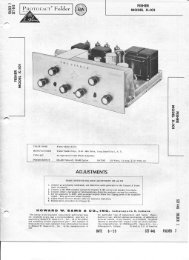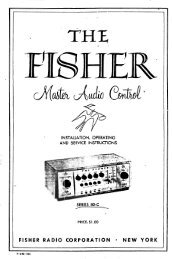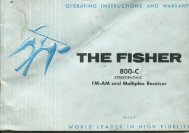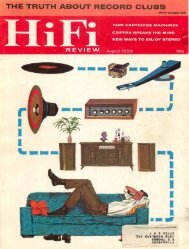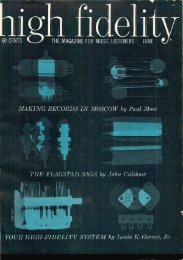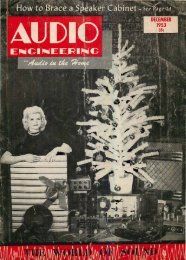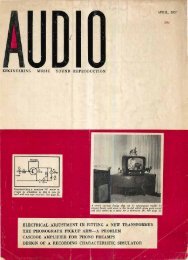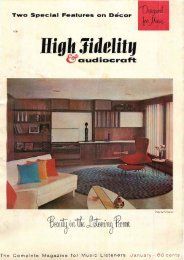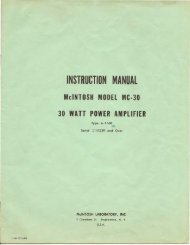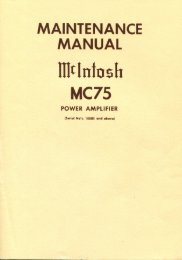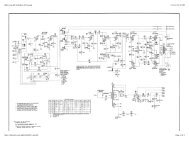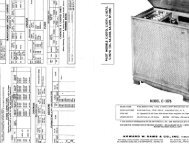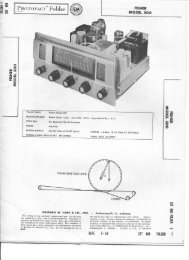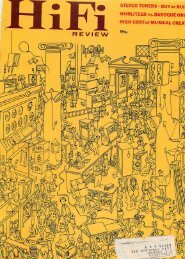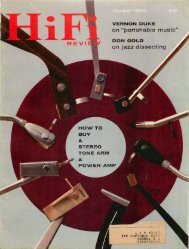~flr'6,r"®
Hifi Stereo Review â July 1958 - Vintage Vacuum Audio
Hifi Stereo Review â July 1958 - Vintage Vacuum Audio
- No tags were found...
You also want an ePaper? Increase the reach of your titles
YUMPU automatically turns print PDFs into web optimized ePapers that Google loves.
the time will seem right to play it. W e also often take<br />
numbers that we've been playing out of the book and<br />
put them away for a while."<br />
Ellington, especially b etween 1950-56 when his band<br />
appeared to be belo·w his standards, has been sharply<br />
criticized by some critics for not abandoning the grueling,<br />
time-devouring life of a traveling band leader and<br />
instead devoting all his time to composing.<br />
"I have a fear of writing something and not being able<br />
to hear it right away."<br />
''I'm much too impatient to do that," he explains. "I<br />
have a fear of writing something and not being able to<br />
hear it right away. That's the worst thing that can<br />
happen to any artist. In fact, if the band hadn't always<br />
been there for me to try my pieces on, I doubt if I'd<br />
have gotten nearly as much writing done as I have.<br />
This business of just being a composer, in any case,<br />
isn't easy. Look at the hundreds of good composers<br />
who come out of the conservatories each year, write<br />
hundreds of symphonies, and never hear them played.<br />
No, I prefer being sure my music will be played and<br />
will be heard, and the best insurance is having one's<br />
own band around all the time to play it."<br />
In view of his constant writing, playing and traveling,<br />
Ellington is less concerned with analysis of his past<br />
work- and with jazz criticism in general-than he is<br />
with continuing to produce. H e is, however, wryly<br />
skeptical of the over-generalization and romanticism<br />
contained in much of the writing and talking about<br />
jazz by non-professionals. Ellington, for example, was<br />
recently the initial guest on the educational TV series,<br />
The Subject Is Jazz, produced by NBC and the Edu ca~<br />
tional Television and Radio Center. H e was criticized<br />
by some of the staff after the program for having been<br />
"difficult."<br />
Ellington's own explanation is that he rebelled at the<br />
vagueness of the questions and the attempts to have<br />
some of his answers suggested to him. "I just wouldn't<br />
fall into line," grinned Ellington.<br />
On the air, Gilbert Seldes, host of the series, tried to<br />
lead Ellington into the customary emphasis on the<br />
primacy in jazz of the "b eat." Ellington resisted. ("They<br />
wanted me to say, 'Yeah, man, that's it, give me that<br />
rhythm!' ".) Instead Ellington said, "The 'beat' is a<br />
. dangerous word in that it implies that the rhythm h as<br />
to be steady, repetitious. Yet I've heard what to me<br />
is real great jazz with no 'beat' as such."<br />
24<br />
"After all ," he told a friend after the program, "it was<br />
more than twenty-five years before I had a drummer<br />
who took a drum solo. The recurring b eat isn't the<br />
most important element in jazz. The test is whether<br />
each specific performance sounds good."<br />
Ellin gton, in fact, has never composed or played according<br />
to others' preconceived ideas of what jazz is<br />
or should be. "I just write a piece; it's the others who<br />
call it jazz."<br />
A favorite Ellington axiom is "a man doesn't begin<br />
to be educated until he knows what he wants to learn."<br />
H e applies this dictum to his writing in the sense that<br />
he regards most of his compositions as musical problems<br />
to be solved, as challenges to be overcome. It's<br />
not that Ellington doesn't write for emotional selfexpression,<br />
but that he is also constantly b eguiled by<br />
the technical delights of music-patterning itself.<br />
In conversation with friends, Ellington has observed<br />
that in his initial years as a composer, he emphasized<br />
writing for specific soloists although he was also concerned<br />
with the sound of the b and as a whole. Many<br />
of the more creative soloists in those years did, however,<br />
have technical limitations in terms of range or<br />
quickness of facility; and Ellington enjoyed taking advantage<br />
of their limitations by writing with their particular<br />
skills and limitations in mind. H e found this<br />
kind of challenge-writing to stimulate a soloist to<br />
sound at his best-exhilarating!<br />
Found-<br />
A New Challenge<br />
Today Ellington is somewhat saddened as a writer<br />
by the fact that nearly all of the younger jazzmen can<br />
technically play anything. Ellington, therefore, now<br />
seeks his challenges more in what colors he can get<br />
from varying groupings of instruments than in taking<br />
as much care with the solo parts as h e used to. "A<br />
primary challenge," Ellington says, "in writing for a<br />
group is to make wh atever size group you h ave sound<br />
"Hamlet, after all, is the story of a killer disguised<br />
as a clown."<br />
larger. In my case, the further challenge is involved<br />
in the fact that I only have fifteen men and that it's a<br />
matter of Im owledge that certain groups of instruments<br />
usually produce only certain kin ds of colors. I, however,<br />
h'y to group and voice the instruments in such a<br />
way that the unexpected happens."<br />
Ellington h as written relatively little music for<br />
strings, although he's eager to experiment with them.<br />
The lack, however, of chances to work with strings<br />
H ;,:FI & MUSIC REVIEW



